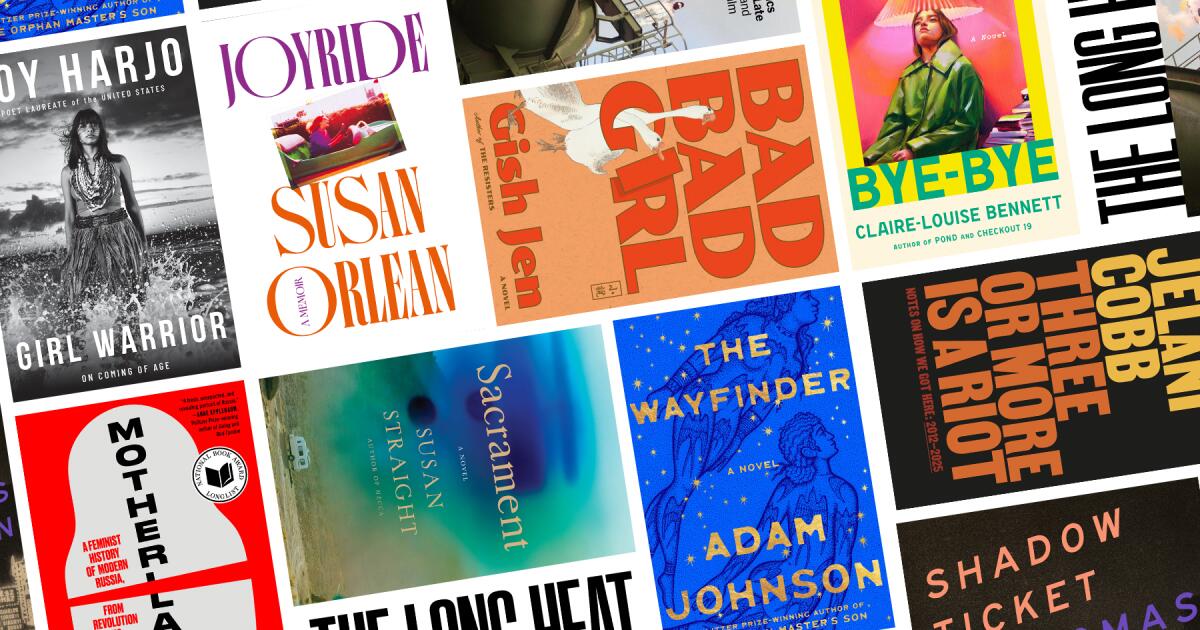Reading List
10 books for your October reading list
If you buy books linked on our site, The Times may earn a commission from Bookshop.org, whose fees support independent bookstores.
Challenges we all face — in one form or another — are reflected in new books this month: Nonfiction titles about climate change, Indigenous issues and racism offer new perspectives on reality — yet so do fiction titles about parental rage, first-responder trauma and past loves. However, as long as there are humans writing, there will also be books filled with wit and joy. Happy reading!
FICTION
Shadow Ticket
By Thomas Pynchon
Penguin Press: 304 pages, $30
(Oct. 7)
At 88, in his first novel in more than a decade, Pynchon turns not to dystopian modern America, but to the comforts of noir fiction. His gumshoe, Hicks McTaggart, starts out in Depression-era Milwaukee, investigating the disappearance of the heiress to a dairy fortune. Like a cheese sauce, the plot thickens — before long McTaggart lands in Central Europe, where new complications for the detective et al. allow his famed but reclusive creator to indulge in his singularly sly and humorous writing.
The Wayfinder
By Adam Johnson
MCD: 736 pages, $30
(Oct. 14)
In the remote South Pacific during the Middle Ages, a young leader, Kōrero, accepts food for her starving people. In return, she agrees that Bird Island will support two Tongan princes in their battle against their uncle, who has seized power. While the long, twisty plot about the politics of war is spellbinding, Johnson (who won a Pulitzer for 2012’s “The Orphan Master’s Son”) excels at showing how an oral tradition’s stories provide nourishment.
Big Kiss, Bye-Bye
By Claire-Louise Bennett
Riverhead: 224 pages, $29
(Oct. 21)
Like Joris-Karl Huysmans did with “The Damned,” which the protagonist is reading, Bennett (“Checkout 19”) crafts an epistolary novel not in letters sent, but in letters that protagonist puts in her journal, to men with whom she’s had (in her words) “dealings with,” including one who will no longer respond, and one who can’t. The gap between bodily experience and how to capture it on the page results in writing swollen with desire — and its rare fulfillment.
Bad Bad Girl
By Gish Jen
Knopf: 352 pages, $30
(Oct. 21)
Originally intended as a memoir, Jen’s account of a Chinese-born mother and her American-born daughter works brilliantly as a novel because only fiction could give this deceased parent (Jen’s mother died in 2020) a full, contrapuntal voice. As the elder berates her child for being a “bad bad girl,” the reader will hear the echoes of her own mother’s chastisements, a song of intergenerational despair.
Sacrament
By Susan Straight
Counterpoint: 352 pages, $29
(Oct. 28)
Three first-responder nurses during the pandemic live in a hastily planned trailer park near the San Bernardino hospital where all day, every day they confront the comatose and the dying. Cherrise, Larette and Marisol (the first two are cousins) are torn between caring for their patients and missing their families in a moment few of us will soon forget. Straight offers their grief and work much as a celebrant holds up a sacrifice, for all to see and contemplate.
NONFICTION
Girl Warrior: On Coming of Age
By Joy Harjo
W. W. Norton: 176 pages, $22
(Oct. 7)
Harjo, a member of the Muscogee Nation, spent three terms as U.S. Poet Laureate. Her first memoir, 2012’s “Crazy Brave,” focused on the birth and development of her poetic voice. In “Girl Warrior,” she uses her life experience to inspire, particularly to inspire younger Native women, writing about the importance of stories and songs to build community. As Harjo has written, “Remember that you are all people and all people are you.” It’s a beautiful memoir.
The Long Heat: Climate Politics When It’s Too Late
By Andreas Malm & Wim Carton
Verso: 656 pages, $40
(Oct. 7)
Last year, the authors released “Overshoot: How the World Surrendered to Climate Breakdown.” “The Long Heat” details what might occur if capitalism based on fossil fuels cannot be overturned, in three sections with bleak views on adaptation, emissions and geo-engineering. Many will argue with their conclusions, but their impeccable research and clear-cut cause-and-effect scenarios might at least spur actionable change.
Three or More Is a Riot: Notes on How We Got Here, 2012-2025
By Jelani Cobb
One World: 496 pages, $32
(Oct. 14)
Cobb, dean of the Columbia graduate school of journalism, co-edited the 2021 updated “Essential Kerner Commission Report,” originally written after the 1965 Watts Riots, and his new book dives into the hypocrisies of Black life in America. Much of this work was first published in the New Yorker, where Cobb is a staff writer.
Joyride: A Memoir
By Susan Orlean
Avid Reader Press: 368 pages, $32
(Oct. 14)
The acclaimed author of “The Orchid Thief” usually looks “outward, not inward,” but that works superbly for a memoir that is less about the subject’s psychology and more about the view ahead that Orlean has pursued for decades. From her bookish Ohio upbringing to her early forays into feature writing, her anecdotes sing with the pleasure of a person born to her passion and purpose. Readers will love it; writers will learn from it.
Motherland: A Feminist History of Modern Russia, From Revolution to Autocracy
By Julia Ioffe
Ecco: 512 pages, $35
(Oct. 21)
American journalist (and co-founder of Puck) Julia Ioffe was born in Moscow and knows firsthand that, for example, when her mother started medical school in the 1970s, 70% of doctors in the Soviet Union were women. But what that government claimed to be a great feminist emancipation has not been a lasting one, and the author finds parallels to and warnings of what might happen in this country if women’s rights continue to be diminished.

